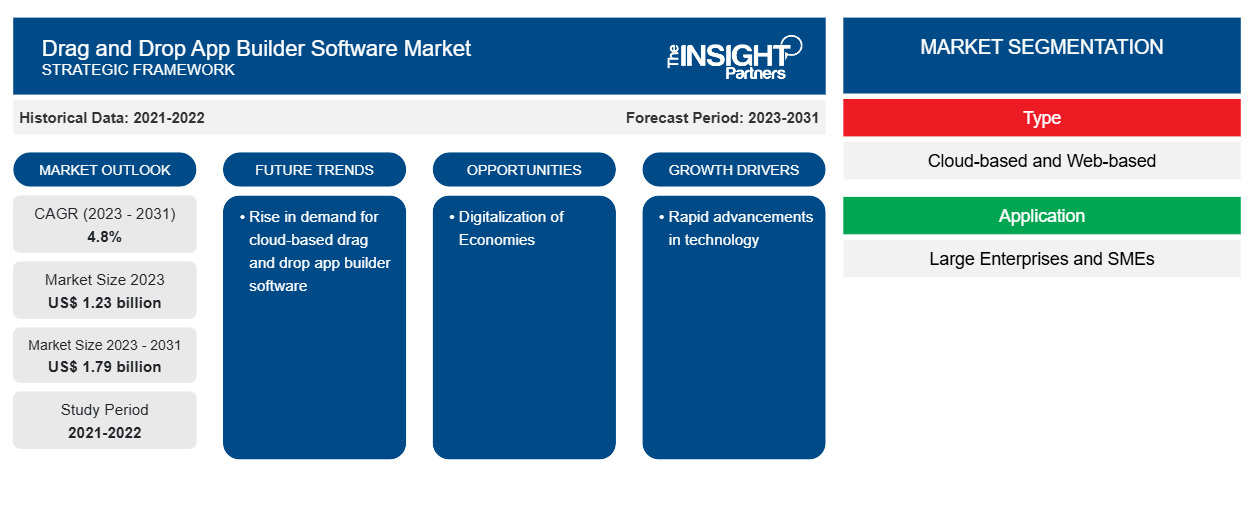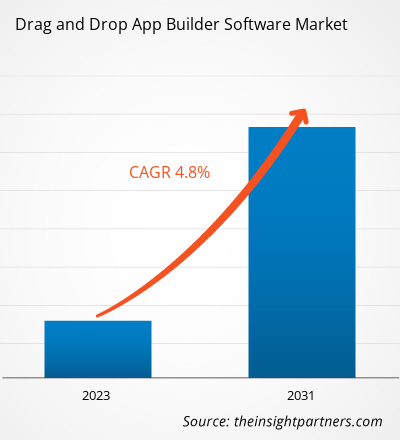The drag and drop app builder software market size is expected to grow from US$ 1.23 billion in 2023 to US$ 1.79 billion by 2031; it is anticipated to expand at a CAGR of 4.8% from 2023 to 2031. The rise in demand for cloud-based drag and drop app builder software is likely to remain a key drag and drop app builder software market trends.
Drag and Drop App Builder Software Market Analysis
The rapid advancements in technology, such as cloud computing and mobile app development, have contributed to the growth of the drag and drop app builder software market.
Drag and Drop App Builder Software Market Overview
Drag and drop app builder software is a revolutionary tool that empowers businesses to create customized mobile applications without the need for complex coding or technical expertise. With this intuitive software, even individuals with limited technical knowledge can design and develop feature-rich apps that cater to their specific business needs. Furthermore, this software offers a wide range of pre-built templates and modules that can be easily customized to reflect a company's branding and unique requirements. Businesses can add their logos, colors, and fonts to create a cohesive and professional app that aligns with their brand identity.
Customize This Report To Suit Your Requirement
You will get customization on any report - free of charge - including parts of this report, or country-level analysis, Excel Data pack, as well as avail great offers and discounts for start-ups & universities
Drag and Drop App Builder Software Market: Strategic Insights

-
Get Top Key Market Trends of this report.This FREE sample will include data analysis, ranging from market trends to estimates and forecasts.
Drag and Drop App Builder Software Market Drivers and Opportunities
Rapid advancements in technology to Favor Market
Technological advancements, such as cloud computing and mobile app development, have played a significant role in the growth of the drag and drop app builder software market. These advancements have revolutionized the mobile app development industry and opened up new possibilities for businesses and developers to create rich and immersive mobile experiences. In conclusion, the rapid advancements in technology, including cloud computing and the adoption of low-code and no-code development platforms, have contributed to the growth of the drag and drop app builder software market. These advancements have revolutionized the mobile app development industry, making it more accessible and efficient for businesses and developers to create innovative and immersive mobile experiences.
Digitalization of Economies
The digitalization of economies has led to an increased demand for user-friendly app development tools, which has contributed to the growth of the drag and drop app builder software market. These platforms allow developers to create customized apps without extensive coding requirements or with minimal hand-coding, enabling them to accelerate the development of high-quality products. This is in contrast to the conventional software development life cycle (SDLC) that typically involves more time and effort. The rapid pace of digital transformation has driven companies to meet consumer needs quickly, and drag and drop app builders have emerged as a solution to facilitate this process.
Drag and Drop App Builder Software Market Report Segmentation Analysis
Key segments that contributed to the derivation of the Drag and Drop App Builder Software market analysis are type and application.
- Based on type, the market is divided into cloud-based and web-based. The cloud-based segment held a larger market share in 2023.
- In terms of application, the market is bifurcated into large enterprises and SMEs. The large enterprises segment held a larger market share in 2023.
Drag and Drop App Builder Software Market Share Analysis by Geography
The geographic scope of the drag and drop app builder software market report is mainly divided into five regions: North America, Asia Pacific, Europe, Middle East & Africa, and South America/South & Central America. North America dominated the drag and drop app builder software market in 2023. The United States and Canada have heavily invested in research and development activities, leading to the development of advanced and innovative technologies in the drag and drop app builder software market. Furthermore, Small and medium-sized enterprises (SMEs) operating in the IT sector in North America are expected to drive the market due to the growing affordability of cloud-based solutions.
Drag and Drop App Builder Software Market Regional InsightsThe regional trends and factors influencing the Drag and Drop App Builder Software Market throughout the forecast period have been thoroughly explained by the analysts at The Insight Partners. This section also discusses Drag and Drop App Builder Software Market segments and geography across North America, Europe, Asia Pacific, Middle East and Africa, and South and Central America.
Drag and Drop App Builder Software Market Report Scope
| Report Attribute | Details |
|---|---|
| Market size in 2023 | US$ 1.23 billion |
| Market Size by 2031 | US$ 1.79 billion |
| Global CAGR (2023 - 2031) | 4.8% |
| Historical Data | 2021-2022 |
| Forecast period | 2023-2031 |
| Segments Covered |
By Type
|
| Regions and Countries Covered |
North America
|
| Market leaders and key company profiles |
|
Drag and Drop App Builder Software Market Players Density: Understanding Its Impact on Business Dynamics
The Drag and Drop App Builder Software Market is growing rapidly, driven by increasing end-user demand due to factors such as evolving consumer preferences, technological advancements, and greater awareness of the product's benefits. As demand rises, businesses are expanding their offerings, innovating to meet consumer needs, and capitalizing on emerging trends, which further fuels market growth.

- Get the Drag and Drop App Builder Software Market top key players overview
Drag and Drop App Builder Software Market News and Recent Developments
The Drag and Drop App Builder Software market is evaluated by gathering qualitative and quantitative data post primary and secondary research, which includes important corporate publications, association data, and databases. The following is a list of developments in the market:
- In December 2020, Quixy, a prominent no-code application development, and Business Process Management (BPM) platform, achieved the distinguished recognition of being named a "Leader" in the No-Code Application Development category by G2, a renowned industry authority.
(Source: Quixy, Press Release, 2020)
- In September 2020, DronaHQ organized a No-Code Hackathon with the aim of engaging B-school students and fostering the traits of citizen development and a problem-solving mindset. The hackathon provided an opportunity for students to learn app development without the need for in-depth coding knowledge.
(Source: DronaHQ, Press Release, 2020)
Drag and Drop App Builder Software Market Report Coverage and Deliverables
The "Drag and Drop App Builder Software Market Size and Forecast (2021–2031)" report provides a detailed analysis of the market covering below areas:
- Market size and forecast at global, regional, and country levels for all the key market segments covered under the scope
- Market dynamics such as drivers, restraints, and key opportunities
- Key future trends
- Detailed PEST/Porter's Five Forces and SWOT analysis
- Global and regional market analysis covering key market trends, major players, regulations, and recent market developments
- Industry landscape and competition analysis covering market concentration, heat map analysis, prominent players, and recent developments
- Detailed company profiles
Frequently Asked Questions
What is the estimated market size for the global drag and drop app builder software market in 2023?
What are the driving factors impacting the global drag and drop app builder software market?
What are the future trends of the global drag and drop app builder software market?
Which are the key players holding the major market share of the global drag and drop app builder software market?
What will be the market size of the global drag and drop app builder software market by 2031?
- Historical Analysis (2 Years), Base Year, Forecast (7 Years) with CAGR
- PEST and SWOT Analysis
- Market Size Value / Volume - Global, Regional, Country
- Industry and Competitive Landscape
- Excel Dataset
Recent Reports
Related Reports
Testimonials
Reason to Buy
- Informed Decision-Making
- Understanding Market Dynamics
- Competitive Analysis
- Identifying Emerging Markets
- Customer Insights
- Market Forecasts
- Risk Mitigation
- Boosting Operational Efficiency
- Strategic Planning
- Investment Justification
- Tracking Industry Innovations
- Aligning with Regulatory Trends





















 Get Free Sample For
Get Free Sample For